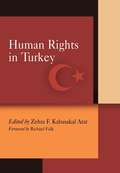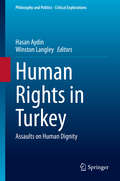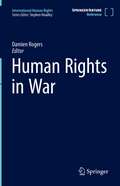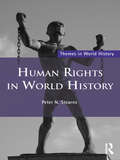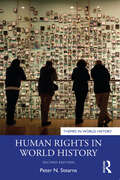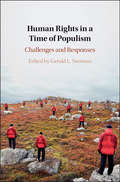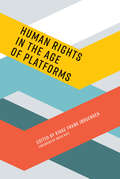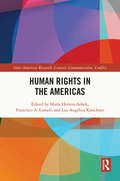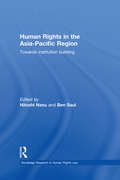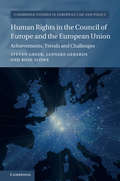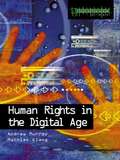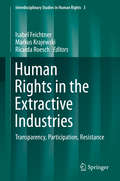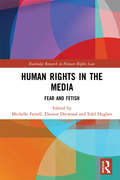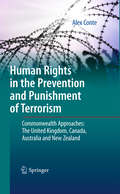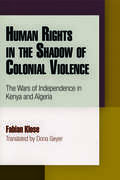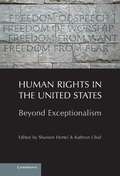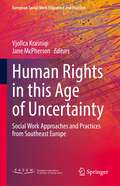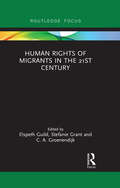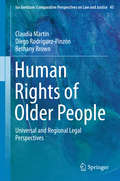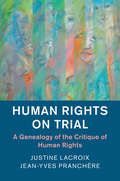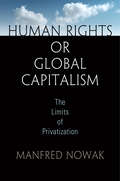- Table View
- List View
Human Rights in Turkey (Pennsylvania Studies in Human Rights)
by Zehra F. Kabasakal AratTurkey's mixed human rights record has been highly politicized in the debate surrounding the country's probable ascendance to membership in the European Union. Beginning with the foundation of a secular republic in 1923, and continuing with founding membership in the United Nations and participation in the European Convention on Human Rights and Fundamental Freedoms, Turkey made significant commitments to the advancement of human rights. However, its authoritarian tradition, periods of military rule, increasing social inequality, and economic crises have led to policies that undermine human rights. While legislative reforms and civil social activism since the 1980s have contributed greatly to the advancement of human rights, recent progress is threatened by the rise of nationalism, persistent gender inequality, and economic hardship.In Human Rights in Turkey, twenty-one Turkish and international scholars from various disciplines examine human rights policies and conditions since the 1920s, at the intersection of domestic and international politics, as they relate to all spheres of life in Turkey. A wide range of rights, such as freedom of the press and religion, minority, women's, and workers' rights, and the right to education, are examined in the context of the history and current conditions of the Republic of Turkey.In light of the events of September 11, 2001, and subsequent developments in the Middle East, recent proposals about modeling other Muslim countries after Turkey add urgency to an in-depth study of Turkish politics and the causal links with human rights. The scholarship presented in Human Rights in Turkey holds significant implications for the study of human rights in the Middle East and around the globe.
Human Rights in Turkey: Assaults on Human Dignity (Philosophy and Politics - Critical Explorations #15)
by Winston Langley Hasan AydinThe book provides the historical setting of Turkey related to the development of democracy, human rights issues, the treatment of cultural and ethnic minorities, and the short- and long-term consequences of the crackdown including impacts on individuals, institutions like education and the media, the criminal justice system, the economy, and Turkey’s standing in the international community. Since the foundation of the Republic of Turkey, the military and the media have been the main traditional powers of oppressive, secularist, and nationalist regimes in the country. After a period of initial reforms, rather than eliminating the structures of the authoritarian state, Recep Tayyip Erdoğan seized the levers of power and used them aggressively against his political enemies. He turned Turkey into a one-man regime after the failed coup attempt on July 15, 2016, and his actions included the widespread violation of human rights.This book tells the tale of the consequences of the measures taken after the failed coup attempt that have adversely impacted the development of democracy and human rights in Turkey, altering the nation’s course of history. Beginning with a State of Emergency that was declared in July of 2016, Turkey has moved to a more authoritarian state. Among the consequences of the actions taken have been imprisonment of hundreds of thousands, the shuttering of media, the dismissal of public employees, the dismissal of academics, jailed elected Kurdish politicians, and the misuse of the criminal justice to victimize the population. Adverse effects have included widespread violations of human rights, torture, and mistreatment of prisoners, false imprisonment, and the absence of the right to a fair trial. This book examines some of the thorniest questions of Turkish democratization and human rights, including the underlying reasons for the decay of democracy and what has happened as a result of this decay. Among these is a deterioration of the educational system, a reduction in economic stability, the absence of the rule of law and due process, a radical transformation of the country, and violations of universal human rights.Endorsements:As one who knows people who have been victimized by the authoritarian regime in Turkey, “Human Rights in Turkey” provides unique insights and perspectives on the changes that have befallen his wonderful country. It is truly insightful. David L. Carter, Ph.D., Michigan State UniversityHuman Rights in Turkey: Assaults on Human Dignity fills a major gap in contemporary political scholarship. Its elucidation of Turkey’s democratic backsliding into a one-man authoritarian regime is insightful and unique. Absolutely required reading for anyone who cares about this beautiful country, its wonderful people, and its uncertain future. Kati Piri, Member of the European Parliament and Delegation to the EU-Turkey Joint Parliamentary CommitteeAydin’s and Langley’s book addresses critical issues in a critical case. Turkey had been regarded as a rising democracy in a troubled region, but in recent years the country has experienced troubling signs of democratic erosion. Central to that decline is the precarious status of basic human rights of expression, association, religion, and due process. This book explores what has happened and how it affects individuals and the Turkish polity more broadly.John M. Carey, Ph.D.. Wentworth Professor in the Social Sciences, Dartmouth College, NH, USATurkey was once a poster-boy of the league of modernizing countries – a staunch ally of the West, an almost-democracy that would become better soon enough. It might even be the first Muslim country to join the European Union. That image now lies shattered under the erratic one-man-show of Tayyip Erdoğan. The police state reigns supreme, opposition is cowed, the courts are in shambles, and more journalists are jailed for their opinions than in any
Human Rights in War (International Human Rights)
by Damien RogersThis volume is the most comprehensive and up-to-date compilation of in-depth analyses on human rights violations committed in war. It offers myriad perspectives on the content and application of legal protections offered to civilians, including women, children and the elderly, and to others who are ‘no longer active in the fight.’ A series of carefully researched case studies illustrates the extent to which human rights violations occur in recent and current armed conflict, and signals the ways in which these violations are dealt with. Each of the contributing authors has been selected on the basis of their international academic reputation and/or professional standing within the human rights field. Given the alarming numbers of people harmed in recent and current armed conflict, this book will be of great interest to researchers, policymakers and opinion-shapers alike.
Human Rights in World History (Themes in World History)
by Peter N. StearnsDefended by a host of passionate advocates and organizations, certain standard human rights have come to represent a quintessential component of global citizenship. There are, however, a number of societies who dissent from this orthodoxy, either in general or on particular issues, on the basis of political necessity, cultural tradition, or group interest. Human Rights in World History takes a global historical perspective to examine the emergence of this dilemma and its constituent concepts. Beginning with premodern features compatible with a human rights approach, including religious doctrines and natural rights ideas, it goes on to describe the rise of the first modern-style human rights statements, associated with the Enlightenment and contemporary antislavery and revolutionary fervor. Along the way, it explores ongoing contrasts in the liberal approach, between sincere commitments to human rights and a recurrent sense that certain types of people had to be denied common rights because of their perceived backwardness and need to be "civilized". These contrasts find clear echo in later years with the contradictions between the pursuit of human rights goals and the spread of Western imperialism. By the second half of the 20th century, human rights frameworks had become absorbed into key global institutions and conventions, and their arguments had expanded to embrace multiple new causes. In today’s postcolonial world, and with the rise of more powerful regional governments, the tension between universal human rights arguments and local opposition or backlash is more clearly delineated than ever but no closer to satisfactory resolution.
Human Rights in World History (Themes in World History)
by Peter N. StearnsThis book takes a global historical perspective to trace the rise of human rights and their global impact from the 18th century to the present. This fully updated volume examines the complex relationships between Western concepts of human rights and developments in other world regions. After providing background on relevant premodern concepts and constraints, the book explores regional interactions with human rights, the disastrous impact of imperialism and racism, the recurrent expansion of the range of rights given to those including women and children, and indigenous rights from the 19th century to the present. Major revisions for the second edition include: • a new chapter focusing on recent historical and interdisciplinary debates • a separate chapter on developments between the world wars • greater attention to causation and an expanded treatment of some regions, including Africa • an analysis of the mix of setbacks and rights expansion during the past 15 years, within the global framework. Human Rights in World History is essential reading for students, scholars, and researchers interested in modern history, human rights, and political science.
Human Rights in a Time of Populism: Challenges and Responses
by Gerald L. NeumanThe electoral successes of right-wing populists since 2016 have unsettled world politics. The spread of populism poses dangers for human rights within each country, and also threatens the international system for protecting human rights. Human Rights in a Time of Populism examines causes, consequences, and responses to populism in a global context from a human rights perspective. It combines legal analysis with insights from political science, international relations, and political philosophy. Authors make practical recommendations on how the human rights challenges caused by populism should be confronted. This book, with its global scope, international human rights framing, and inclusion of leading experts, will be of great interest to human rights lawyers, political scientists, international relations scholars, actors in the human rights system, and general readers concerned by recent developments.
Human Rights in the Age of Platforms (Information Policy)
by Rikke Frank JørgensenScholars from across law and internet and media studies examine the human rights implications of today's platform society.Today such companies as Apple, Facebook, Google, Microsoft, and Twitter play an increasingly important role in how users form and express opinions, encounter information, debate, disagree, mobilize, and maintain their privacy. What are the human rights implications of an online domain managed by privately owned platforms? According to the Guiding Principles on Business and Human Rights, adopted by the UN Human Right Council in 2011, businesses have a responsibility to respect human rights and to carry out human rights due diligence. But this goal is dependent on the willingness of states to encode such norms into business regulations and of companies to comply. In this volume, contributors from across law and internet and media studies examine the state of human rights in today's platform society.The contributors consider the “datafication” of society, including the economic model of data extraction and the conceptualization of privacy. They examine online advertising, content moderation, corporate storytelling around human rights, and other platform practices. Finally, they discuss the relationship between human rights law and private actors, addressing such issues as private companies' human rights responsibilities and content regulation.ContributorsAnja Bechmann, Fernando Bermejo, Agnès Callamard, Mikkel Flyverbom, Rikke Frank Jørgensen, Molly K. Land, Tarlach McGonagle, Jens-Erik Mai, Joris van Hoboken, Glen Whelan, Jillian C. York, Shoshana Zuboff, Ethan ZuckermanOpen access edition published with generous support from Knowledge Unlatched and the Danish Council for Independent Research.
Human Rights in the Americas (InterAmerican Research: Contact, Communication, Conflict)
by Francisco A. Lomelí María Herrera-Sobek Luz Angélica KirschnerThis interdisciplinary book explores human rights in the Americas from multiple perspectives and fields. Taking 1492 as a point of departure, the text explores Eurocentric historiographies of human rights and offer a more complete understanding of the genealogy of the human rights discourse and its many manifestations in the Americas. The essays use a variety of approaches to reveal the larger contexts from which they emerge, providing a cross-sectional view of subjects, countries, methodologies and foci explicitly dedicated toward understanding historical factors and circumstances that have shaped human rights nationally and internationally within the Americas. The chapters explore diverse cultural, philosophical, political and literary expressions where human rights discourses circulate across the continent taking into consideration issues such as race, class, gender, genealogy and nationality. While acknowledging the ongoing centrality of the nation, the volume promotes a shift in the study of the Americas as a dynamic transnational space of conflict, domination, resistance, negotiation, complicity, accommodation, dialogue, and solidarity where individuals, nations, peoples, institutions, and intellectual and political movements share struggles, experiences, and imaginaries. It will be of interest to all scholars and students of InterAmerican studies and those from all disciplines interested in Human Rights.
Human Rights in the Asia-Pacific Region: Towards Institution Building (Routledge Research in Human Rights Law)
by Hitoshi Nasu Ben SaulThe Asia-Pacific is known for having the least developed regional mechanisms for protecting human rights. This edited collection makes a timely and distinctive contribution to contemporary debates about building institutions for human rights protection in the Asia-Pacific region, in the wake of ASEAN’s establishment in 2009 of a sub-regional human rights commission. Drawing together leading scholarly voices, the book focuses on the systemic issue of institutionalising human rights protection in the Asia-Pacific. It critically examines the prospects for deepening and widening human rights institutions in the region, challenging the orthodox scepticism about whether the Asia-Pacific is "ready" for stronger human rights institutions and exploring the variety of possible forms that regional and sub-regional institutions might take. The volume also analyses the impediments to new institutions, whilst questioning the justifications for them. The collection provides a range of perspectives on the issues and many of the chapters bring interdisciplinary insights to bear. As such, the collection will be of interest to scholarly, practitioner, and student audiences in law, as well as to readers in international relations, political science, Asian studies, and human rights.
Human Rights in the Constitutional Law of the United States
by Michael J. PerryIn the period since the end of the Second World War, there has emerged what never before existed: a truly global morality. Some of that morality - the morality of human rights - has become entrenched in the constitutional law of the United States. This book explicates the morality of human rights and elaborates three internationally recognized human rights that are embedded in U. S. constitutional law: the right not to be subjected to cruel, inhuman, or degrading punishment; the right to moral equality; and the right to religious and moral freedom. The implications of one or more of these rights for three great constitutional controversies - capital punishment, same-sex marriage, and abortion - are discussed in-depth. Along the way, Michael J. Perry addresses the question of the proper role of the Supreme Court of the United States in adjudicating these controversies.
Human Rights in the Council of Europe and the European Union: Achievements, Trends and Challenges (Cambridge Studies In European Law And Policy )
by Janneke Gerards Steven Greer Rose SloweConfusion about the differences between the Council of Europe (the parent body of the European Court of Human Rights) and the European Union is commonplace amongst the general public. It even affects some lawyers, jurists, social scientists and students. This book will enable the reader to distinguish clearly between those human rights norms which originate in the Council of Europe and those which derive from the EU, vital for anyone interested in human rights in Europe and in the UK as it prepares to leave the EU. The main achievements of relevant institutions include securing minimum standards across the continent as they deal with increasing expansion, complexity, multidimensionality and interpenetration of their human rights activities. The authors also identify the central challenges, particularly for the UK in the post-Brexit era where the components of each system need to be carefully distinguished and disentangled.
Human Rights in the Digital Age
by Andrew Murray Mathias KlangThe digital age began in 1939 with the construction of the first digital computer. In the sixty-five years that have followed, the influence of digitisation on our everyday lives has grown steadily and today digital technology has a greater influence on our lives than at any time since its development. This book examines the role played by digital technology in both the exercise and suppression of human rights. The global digital environment has allowed us to reinterpret the concept of universal human rights. Discourse on human rights need no longer be limited by national or cultural boundaries and individuals have the ability to create new forms in which to exercise their rights or even to bypass national limitations to rights. The defence of such rights is meanwhile under constant assault by the newfound ability of states to both suppress and control individual rights through the application of these same digital technologies. This book gathers together an international group of experts working within this rapidly developing area of law and technology and focuses their attantion on the specific interaction between human rights and digital technology. This is the first work to explore the challenges brought about by digital technology to fundamental freedoms such as privacy, freedom of expression, access, assembly and dignity. It is essential reading for anyone who fears digital technology will lead to the 'Big Brother' state.
Human Rights in the Extractive Industries: Transparency, Participation, Resistance (Interdisciplinary Studies in Human Rights #3)
by Isabel Feichtner Markus Krajewski Ricarda RoeschThis book addresses key challenges and conflicts arising in extractive industries (mining, oil drilling) concerning the human rights of workers, their families, local communities and other stakeholders. Further, it analyses various instruments that have sought to mitigate human rights violations by defining transparency-related obligations and participation rights. These include the Extractive Industries Transparency Initiative (EITI), disclosure requirements, and free, prior and informed consent (FPIC). The book critically assesses these instruments, demonstrating that, in some cases, they produce unwanted effects. Furthermore, it highlights the importance of resistance to extractive industry projects as a response to human rights violations, and discusses how transparency, participation and resistance are interconnected.
Human Rights in the Maya Region: Global Politics, Cultural Contentions, and Moral Engagements
by Pedro Pitarch Shannon Speed Xochitl Leyva SolanoIn recent years Latin American indigenous groups have regularly deployed the discourse of human rights to legitimate their positions and pursue their goals. Perhaps nowhere is this more evident than in the Maya region of Chiapas and Guatemala, where in the last two decades indigenous social movements have been engaged in ongoing negotiations with the state, and the presence of multinational actors has brought human rights to increased prominence. In this volume, scholars and activists examine the role of human rights in the ways that states relate to their populations, analyze conceptualizations and appropriations of human rights by Mayans in specific localities, and explore the relationship between the individualist and "universal" tenets of Western-derived concepts of human rights and various Mayan cultural understandings and political subjectivities. The collection includes a reflection on the effects of truth-finding and documenting particular human rights abuses, a look at how Catholic social teaching validates the human rights claims advanced by indigenous members of a diocese in Chiapas, and several analyses of the limitations of human rights frameworks. A Mayan intellectual seeks to bring Mayan culture into dialogue with western feminist notions of women's rights, while another contributor critiques the translation of the United Nations Declaration of Human Rights into Tzeltal, an indigenous language in Chiapas. Taken together, the essays reveal a broad array of rights-related practices and interpretations among the Mayan population, demonstrating that global-local-state interactions are complex and diverse even within a geographically limited area. So too are the goals of indigenous groups, which vary from social reconstruction and healing following years of violence to the creation of an indigenous autonomy that challenges the tenets of neoliberalism. Contributors: Robert M. Carmack, Stener Ekern, Christine Kovic, Xochitl Leyva Solano, Julin Lpez Garca, Irma Otzoy, Pedro Pitarch, lvaro Reyes, Victoria Sanford, Rachel Sieder, Shannon Speed, Rodolfo Stavenhagen, David Stoll, Richard Ashby Wilson
Human Rights in the Media: Fear and Fetish (Routledge Research in Human Rights Law)
by Michelle Farrell Eleanor Drywood Edel HughesThis collection sets about untangling some of the knotty issues in the underexplored relationship between human rights and the media. We investigate how complex debates in political, judicial, academic and public life on the role and value of human rights are represented in the media, particularly, in print journalism. To focus the discussion, we concentrate on media representation of the controversial proposals in the United Kingdom to repeal the Human Rights Act 1998 and to replace it with a British Bill of Rights. The collection is underpinned by the observation that views on human rights and on the proposals to repeal and replace are polarised. On the one hand, human rights are presented as threatening and, therefore, utterly denigrated; on the other hand, human rights are idolised, and, therefore, uncritically celebrated. This is the ‘fear and fetish’ in our title. The media plays a decisive role in constructing this polarity through its representation of political and ideological viewpoints. In order to get to grips with the fear, the fetish and this complex interrelationship, the collection tackles key contemporary themes, amongst them: the proposed British Bill of Rights, Brexit, prisoner-voting, the demonisation of immigrants, press freedom, tabloid misreporting, trial by media and Magna Carta. The collection explores media representation, investigates media polarity and critiques the media’s role.
Human Rights in the Middle East
by Mahmood MonshipouriExploring the most formidable human rights challenges facing the Middle East - the rights of women, minorities, migrant workers, and those of various sexual orientations, and the rights of all people to engage in civil disobedience - this volume addresses the extent to which dynamics surrounding human rights conditions in the region conform to or diverge from such dynamics in other parts of the world. Offering wide-ranging and rich analyses, the contributors to this volume argue that for human rights to be effectively enforced, they must be locally justified and achieved. The 2011 Arab revolts demonstrate that the people of the region can shape the condition of human rights in their societies.
Human Rights in the Prevention and Punishment of Terrorism
by Alex ConteThis title takes a comparative approach to the evaluation of human rights in the prevention and punishment of terrorism within the United Kingdom, Canada, Australia and New Zealand. The text first looks at the question of defining terrorism, and examines the international and domestic frameworks for countering terrorism. The second part of the book provides an overview and analysis of international and regional human rights law and its capacity to allow for the limitation of rights and freedoms when pursing important objectives such as the countering of terrorism, as well as providing a comparative review of human rights laws in each country. The final and most extensive part of the text begins with an overview of the interaction between counter-terrorism and human rights, followed by thematic and case study evaluations of discreet topics.
Human Rights in the Shadow of Colonial Violence: The Wars of Independence in Kenya and Algeria (Pennsylvania Studies in Human Rights)
by Fabian KloseHuman Rights in the Shadow of Colonial Violence explores the relationship between the human rights movement emerging after 1945 and the increasing violence of decolonization. Based on material previously inaccessible in the archives of the International Committee of the Red Cross and the United Nations Human Rights Commission, this comparative study uses the Mau Mau War (1952-1956) and the Algerian War (1954-1962) to examine the policies of two major imperial powers, Britain and France. Historian Fabian Klose considers the significance of declared states of emergency, counterinsurgency strategy, and the significance of humanitarian international law in both conflicts.Klose's findings from these previously confidential archives reveal the escalating violence and oppressive tactics used by the British and French military during these anticolonial conflicts in North and East Africa, where Western powers that promoted human rights in other areas of the world were opposed to the growing global acceptance of freedom, equality, self-determination, and other postwar ideals. Practices such as collective punishment, torture, and extrajudicial killings did lasting damage to international human rights efforts until the end of decolonization.Clearly argued and meticulously researched, Human Rights in the Shadow of Colonial Violence demonstrates the mutually impacting histories of international human rights and decolonization, expanding our understanding of political violence in human rights discourse.
Human Rights in the Twentieth Century
by Stefan-Ludwig HoffmannHas there always been an inalienable "right to have rights" as part of the human condition, as Hannah Arendt famously argued? The contributions to this volume examine how human rights came to define the bounds of universal morality in the course of the political crises and conflicts of the twentieth century. Although human rights are often viewed as a self-evident outcome of this history, the essays collected here make clear that human rights are a relatively recent invention that emerged in contingent and contradictory ways. Focusing on specific instances of their assertion or violation during the past century, this volume analyzes the place of human rights in various arenas of global politics, providing an alternative framework for understanding the political and legal dilemmas that these conflicts presented. In doing so, this volume captures the state of the art in a field that historians have only recently begun to explore.
Human Rights in the United States
by Shareen Hertel Kathryn LibalThis book brings to light emerging evidence of a shift toward a fuller engagement with international human rights norms and their application to domestic policy dilemmas in the United States. The volume offers a rich history, spanning close to three centuries, of the marginalization of human rights discourse in the United States. Contributors analyze cases of U.S. human rights advocacy aimed at addressing persistent inequalities within the United States itself, including advocacy on the rights of persons with disabilities; indigenous peoples; lone mother-headed families; incarcerated persons; lesbian, gay, bisexual and transgendered people; and those displaced by natural disasters. It also explores key arenas in which legal scholars, policy practitioners and grassroots activists are challenging multiple divides between 'public' and 'private' spheres (for example, in connection with children's rights and domestic violence) and between 'public' and 'private' sectors (specifically, in relation to healthcare and business and human rights).
Human Rights in this Age of Uncertainty: Social Work Approaches and Practices from Southeast Europe (European Social Work Education and Practice)
by Vjollca Krasniqi Jane McPhersonThis book, grounded in a human rights framework, takes a close look at social work approaches and practices in Southeast Europe. Human rights are central in today's understanding of social work as an academic discipline and as a professional practice. Looking at social work through a human rights lens unmasks inequality and discrimination, promotes ethical engagements, and contributes to the social, political, and economic betterment of society. Moreover, human rights and social work are interdependent and have far-reaching implications at macro, mezzo, and micro levels both in the realm of social policy and in professional practice.This collection of eight chapters provides an overview of human rights practices in social work in Albania, Bosnia and Herzegovina, Bulgaria, Croatia, Kosovo, Romania, and Slovenia. It presents state-of-the-art research on human rights and social work through individual country-focused chapters. In addition, it includes an integrative introductory chapter that identifies and discusses the commonalities and differences across the region as well as future directions.The book takes an integrated approach with conversations among the contributors on three main questions:What is the state of human rights in social work?How are human rights practiced in social work? What are the prospects for an integrated approach to human rights in social work in contemporary Southeast Europe?Human Rights in this Age of Uncertainty is essential reading for social work academics and practitioners in Southeast Europe due to its geographic focus and standpoints from the specific countries of the region. The book also should appeal to a wider European audience (especially as the book features chapters from both inside and outside of the European Union), as well as to an international audience of social work scholars. In addition, policy-makers may find the book a useful resource because human rights discourse features prominently in the international approaches to welfare systems across Southeast Europe as part of the Europeanisation processes currently at play.
Human Rights of Migrants in the 21st Century (Routledge Studies in Liberty and Security)
by Elspeth Guild Stefanie Grant C. A. GroenendijkThis book offers an accessible examination of the human rights of migrants in the context of the UN’s negotiations in 2018. This volume has two main contributions. Firstly, it is designed to inform the negotiations on the UN’s Global Compact for Safe, Orderly and Regular Migration announced by the New York Declaration of the UN General Assembly on 19 September 2016. Second, it intends to assist officials, lawyers and academics to ensure that the human rights of migrants are fully respected by state authorities and international organisations and safeguarded by national and supranational courts across the globe. The overall objective of this book is to clarify problem areas which migrants encounter as non-citizens of the state where they are and how international human rights obligations of those states provide solutions. It defines the existing international human rights of migrants and provides the source of States’ obligations. In order to provide a clear and useful guide to the existing human rights of migrants, the volume examines these rights from the perspective of the migrant: what situations do people encounter as their status changes from citizen (in their own country) to migrant (in a foreign state), and how do human rights provide legal entitlements regarding their treatment by a foreign state? This book will be of much interest to students of migration, human rights, international law and international relations.
Human Rights of Older People
by Bethany Brown Claudia Martin Diego Rodríguez-PinzónThis book focuses on descriptions of the developments in legal frameworks and policies regarding the human rights of older persons. First, it covers the policies adopted and practices developed at the universal system, particularly within the sphere of the United Nations. Second, it includes a side-by-side comparison of the work of regional human rights mechanisms, which have picked up some momentum in the past decade. Through its inclusion of law, policy, and current processes, the widest net possible has been cast to collect a descriptive resource for advocates. Overall, we hope that this book contributes to a better understanding of the current limitations and possibilities that international institutions offer to uphold the human rights of older persons. We expect that this information will allow states and other policy makers to move forward with the international recognition of the human rights of older persons. We know this is only a first effort in compiling and reporting the standards that are being produced by different international institutions. But we have no doubt that many others will follow with their expert analysis of these emerging standards, and that the ongoing discussion will finally crystalize in international human rights binding instruments explicitly recognizing the universal rights of older persons.
Human Rights on Trial: A Genealogy Of The Critique Of Human Rights (Human Rights In History Ser.)
by Justine Lacroix Jean-Yves PranchèreThe first systematic analysis of the arguments made against human rights from the French Revolution to the present day. Through the writings of Edmund Burke, Jeremy Bentham, Auguste Comte, Louis de Bonald, Joseph de Maistre, Karl Marx, Carl Schmitt and Hannah Arendt, the authors explore the divergences and convergences between these 'classical' arguments against human rights and the contemporary critiques made both in Anglo-American and French political philosophy. Human Rights on Trial is unique in its marriage of history of ideas with normative theory, and its integration of British/North American and continental debates on human rights. It offers a powerful rebuttal of the dominant belief in a sharp division between human rights today and the rights of man proclaimed at the end of the eighteenth century. It also offers a strong framework for a democratic defence of human rights.
Human Rights or Global Capitalism: The Limits of Privatization
by Manfred NowakThe fall of communism in the late 1980s and the end of the Cold War seemed to signal a new international social order built on pluralist democracy, the rule of law, and universal human rights. <P><P>But the window of opportunity for creating this more just, more equal, and more secure world slammed shut just as quickly as it opened. Rather than celebrate the triumph of democracy over autocracy, or political freedom over totalitarian rule, the West exulted in the victory of capitalism over communism. <P><P>Neoliberal policies of deregulation and privatization that minimized the role of the state were imposed on the transitional societies of Central and Eastern Europe, as well as economically weak and politically fragile nations in Africa, Asia, and Latin America. Twenty-five years later, the world reaps the fruits of that market-driven state foundation: inequality; poverty; global economic, food, financial, social, and ecological crises; transnational organized crime and terrorism; proliferating weapons; fragile states. <P><P>Human Rights or Global Capitalism is not simply concerned with the success or failure of neoliberal policies per se or judging whether they are good or bad. Rather, it examines the application of those policies from a human rights perspective and asks whether states, by outsourcing to the private sector many services with a direct impact on human rights--education, health, social security, water, personal liberty, personal security, equality--abdicate their responsibilities to uphold human rights and thereby violate international human rights law. <P><P>Manfred Nowak explores these examples and outlines the ways in which neoliberal policies contravene the obligations of states to protect the human rights of their people.
